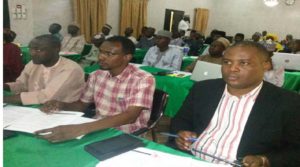Media and agenda setting for effective service delivery and development

This piece looks at the Partnership to Engage, Reform and Learn (PERL’s) quest for increased media engagement with budget processes highlighting the role of the media in achieving transparency and accountability in governance and thus setting the agenda for effective service delivery and sustainable development in Nigeria
The dearth of governance in Nigeria is blamed to a large extent on the failure of citizens to hold those in position of authority accountable and the lack of citizens’ participation in governance processes could be linked to the lack of access to information which limits the citizens’ knowledge and hence their understanding of governance activities at all levels.
Thus, if the citizens are well informed about the functions of various agencies of government including how they formulate and implement their annual budgetary expenditures they will be able to hold agencies responsible for service delivery accountable, for example, regarding critically-important issues like health, education, and water supply.
The media, as a watchdog and fourth estate of the realm is responsible for ensuring citizens are availed with all necessary information about governance processes, including budgetary expenditures which are defined as “an annual financial statement presenting the government’s proposed revenues and spending for a financial year”.
“Effective service delivery requires transparency and accountability and it is the role of the media to create an enabling environment for transparency to be enhanced,” says Fidelis Ekom, a media expert. “Therefore, it is high time journalists begin to report about the various stages of the budget cycle, by highlighting the content of the budgets and explaining what citizens should do to engage with the process.”
Ekom, who was speaking at a recent two-day training for Nigerian journalists on improving media content on budget processes organized by DFID-funded Partnership for Education, Reform and Learning (PERL) program said the media could serve as a bridge between the citizens and policymakers adding that the amount of space the media is able to accord to budget issues would help stimulate the citizens’ interest about it and therefore empower them to engage the process.
As such unless journalists are well knowledgeable about governance including budget processes they will not be able to provide their watchdog function, which is the constitutional responsibility of the media in a democracy. And it is only by working in partnership with policymakers, civic organizations, and the private sector that the media can effectively discharge this function of mobilizing citizens’ participation in governance towards effective service delivery.
“The media can play the role of analysts, by making the citizens understand the process because bureaucrats have a tendency to make the budget look technical. So, the media can simplify the budget for citizens to understand it,” says Otive Igbuzor, federal partnership facilitator at PERL. “The media has a great role to play because when budget processes are done in secrecy, there is a tendency for corruption but when it is transparent and participatory there is a better chance for effective service delivery.”
By demystifying or rather simplifying budget information to the understanding of citizens, the media will be engendering citizens’ participation in budget processes: formulation, approval, implementation, oversight/monitoring and reporting/audit. And by empowering the citizens with information across each of the budget cycles, the media will be mobilizing citizens to hold public officials responsible and therefore entrenching transparency and accountability in governance.
Uzo Amakam is a governance expert and one of the facilitators at PERL’s media training who assert that when the media engages with the executive and legislative arm of government the result was always better service delivery; he therefore called for fairness, inclusivity and equity in governance towards effective service delivery.
“All the major indicators for sustainable development are tied to service delivery and the reason why we failed to achieve the Millennium Development Goals (MDGs) was because of failure in service delivery. Therefore, we need to achieve equity, fairness and inclusivity in governance since the Sustainable Development Goals (SDGs) are also tied to service delivery,” says Amakam.
One of the trainees, Emmanuel Ohiomokhare of the Africa Independent Television (AIT) says the training had entirely changed his perception of budget processes adding that prior to the training his engagement with budget begins only when it was summited to the National Assembly pledging to begin to engage the entire budget cycle, henceforth.
“I am now seeing budget differently, for me there is a paradigm shift as I now see budget from the perspective of service delivery and not just as numbers. I now know that the people are most important when it comes to budget,” says Ohiomokhare.









